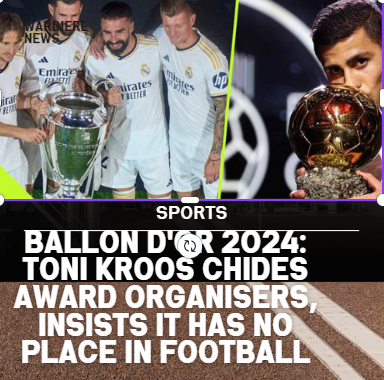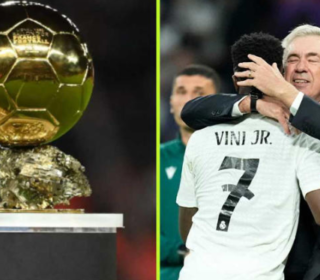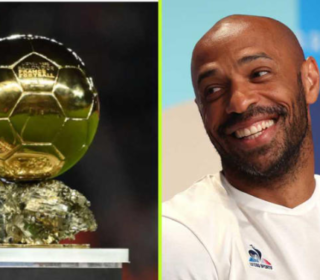As anticipation builds for the 2024 Ballon d’Or ceremony, a surprising voice has emerged against the tradition: Real Madrid midfielder Toni Kroos. Known for his level-headed, thoughtful approach both on and off the pitch, Kroos recently voiced strong opinions, arguing that the Ballon d’Or award lacks relevance in the world of football.
Kroos’ comments have sparked discussions across the football community, challenging the long-standing tradition of awarding the world’s best player and questioning the impact of individual awards in a team sport.

Kroos’ Perspective: Football Is a Team Sport
Kroos made it clear that he believes football, at its core, is a team sport where individual accolades should take a back seat to collective success. He argued that an award like the Ballon d’Or shifts the focus from team accomplishments to individual achievements, which runs counter to the very essence of the game.
“Football is about the team, about winning together. When individual awards become the highlight, it sends the wrong message to players and fans,” Kroos stated. For him, this emphasis on one player being labeled “the best” diminishes the contributions of teammates who play essential roles but don’t receive the same recognition.
The Limitations of the Ballon d’Or in Capturing “Best” Players
One of Kroos’ primary concerns is that the Ballon d’Or process is subjective, often influenced by popularity, media narratives, and recent performances rather than a holistic view of a player’s contribution. He contends that the award can never objectively represent the “best” player because football is multifaceted and context-driven. Different roles on the field contribute to success in various ways, which can be challenging to compare and evaluate with the Ballon d’Or format.
Kroos noted that defenders, midfielders, and goalkeepers rarely win, with the award historically dominated by prolific forwards who score or assist frequently. Kroos sees this as a limitation of the Ballon d’Or, arguing that a midfielder’s value or a defender’s resilience deserves just as much recognition as a forward’s goal-scoring exploits.
Kroos and Real Madrid: Success Over Individual Awards
Kroos’ comments also reflect the culture at Real Madrid, a club known for prioritizing trophies and team accomplishments. As a player who has won multiple Champions League titles and league trophies with Los Blancos, Kroos places his focus on collective achievements. Real Madrid’s tradition of prioritizing team success has likely shaped Kroos’ perspective, as he sees more value in titles and trophies than individual awards.
During his career, Kroos has played a crucial role in the midfield, often overshadowed by forwards and goal-scorers but essential to his teams’ success. His sentiments echo those of many other players who believe individual awards are ultimately secondary to winning as a team.
Fan and Media Reaction
Kroos’ remarks have stirred debate among fans and media alike, with some agreeing that individual awards are at odds with football’s collaborative spirit, while others defend the Ballon d’Or as a chance to celebrate extraordinary talent. Supporters of the Ballon d’Or argue that the award brings excitement and shines a spotlight on players who inspire fans and elevate the sport. Critics, however, echo Kroos’ view, saying that the attention around the Ballon d’Or often overshadows key aspects of football, such as teamwork and tactics.
For many players, especially those in supporting roles, Kroos’ statement resonates. As football becomes more data-driven, with analytics showcasing the importance of all positions, there is a growing push to recognize the less glamorous but equally vital contributions in football.
A Call for Change?
Kroos’ critique of the Ballon d’Or might not end the award, but it does spotlight a conversation many in the football world have had for years. Should there be a change in how individual accolades are given in team sports? Could football find a more balanced way to celebrate individual excellence while honoring the teamwork it requires? Kroos’ call for change may not alter the Ballon d’Or’s place in football overnight, but it does encourage a re-evaluation of how individual success is viewed in a game that depends on everyone on the field.
Conclusion
Toni Kroos’ stance against the Ballon d’Or as “having no place in football” challenges us to rethink the role of individual awards in a sport that thrives on unity and teamwork. Whether the Ballon d’Or will evolve or remain as it is, Kroos’ comments reflect a broader sentiment within football—a belief that the collective triumphs and contributions of every player on the pitch are what truly define the game.
4o
















